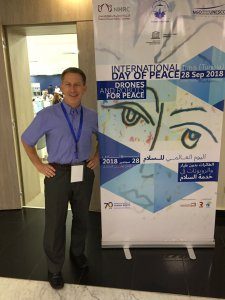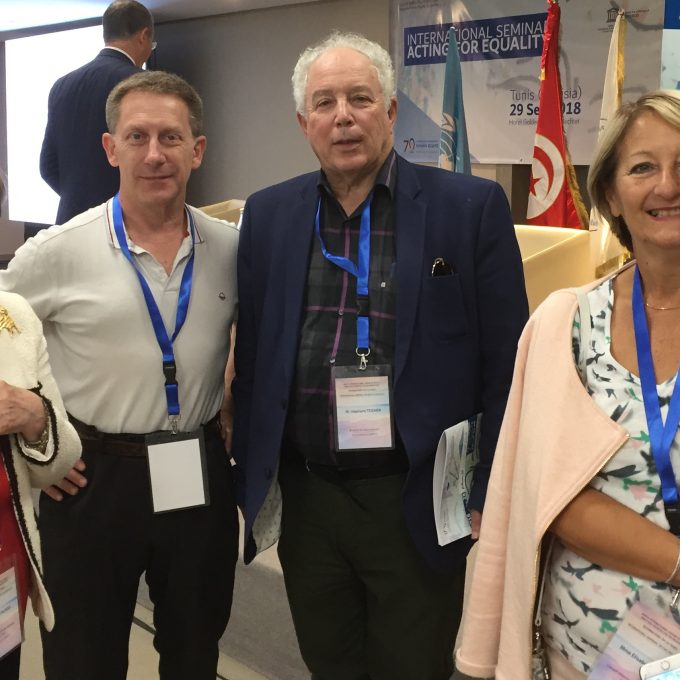ORT’s senior project writer Robert Golbert travelled to Tunisia last month to attend a UNESCO conference being held to celebrate the International Day of Peace.
The theme of the forum was the use of robots and drones for peace, and young people were asked to create videos on the subject.
One which was highlighted by UNESCO was the film made by World ORT Kadima Mada students at the Kfar Silver youth village (watch below).
But Robert’s trip took one or two unexpected turns, as he wrote in the Jewish News. You can read his piece on their site here, or below:

Robert Golbert at the International Day of Peace forum in Tunisia
I knew it would be an interesting trip when I realised I was being followed on the way to the synagogue on the second day of Succot.
I had arrived in Tunis, the capital of Tunisia, two days before. Security was tight – the Great Synagogue of Tunis had been partially damaged by an angry mob in 2011 during the Arab Spring uprising and, earlier this year, a police officer guarding the synagogue was stabbed by a man shouting anti-Israel slogans.
When I arrived, the Tunisian guards let me in only after taking my passport away for a few tense minutes to be “processed and checked”. It was next day as I walked towards the shul from my hotel that I noticed I was being followed.
Unsure what to do, I approached the man and asked him why he was following me. After initial denials, he finally told me he was with “security”, asked me where I was going and told me that he was following me “for my own safety” because all the main tourist sites were in the opposite direction.
I assured him that I knew where I was going and asked him to stop what he was doing. Just to make sure he was no longer on my tail, I ducked into a café and stood in the queue until I was sure the man was gone. I then continued to the synagogue and reached it just in time to make the minyan.
I was in Tunis to represent ORT, the world’s largest Jewish education and training organisation, at a Unesco conference being held to celebrate the International Day of Peace.
There are estimated to be only a few hundred Jews currently left in Tunis out of a high of more than 105,000 in 1948, so my presence at the conference, together with the Unesco delegates from B’nai B’rith International and the International Council of Jewish Women, represented a significant increase in the local Jewish community.
And despite my unnerving experience the day before, I was glad to be in Tunis as a Jew representing ORT at Unesco.
The theme of this year’s International Day of Peace forum was the use of robots and drones as instruments of peace rather than as weapons of war, and young people from around the world were asked to create videos on this theme.
ORT runs a network of Jewish day schools throughout the world specialising in STEM education, including both robotics and drone technologies. The conference theme was therefore a perfect match for us, and our students from several ORT schools created videos.
One of these schools was the World ORT Kfar Silver Youth Village in Israel, just outside Ashkelon near the Gaza border.
The students filmed themselves visiting areas burned during the conflict with Gaza earlier this year. The piece also showed them sending messages of peace to Palestinian children over the border using hand-made drones they had built in school.
We were pleasantly surprised when we were told the video was one of only 10 out of nearly 100 entries from all over the world to be selected by Unesco to be shown at the Tunis forum.
The significance of the fact a video made by Israeli schoolchildren sending messages of peace to Palestinian children in Gaza was chosen to be shown by a United Nations-sponsored organisation in a Muslim Arab country was certainly not lost on us and is something that we and our students are rightly proud of.
Although only symbolic, I hope this may signal a small step forward in the search for mutual understanding and in the building of coexistence and peace between Israel and its Arab neighbours.





